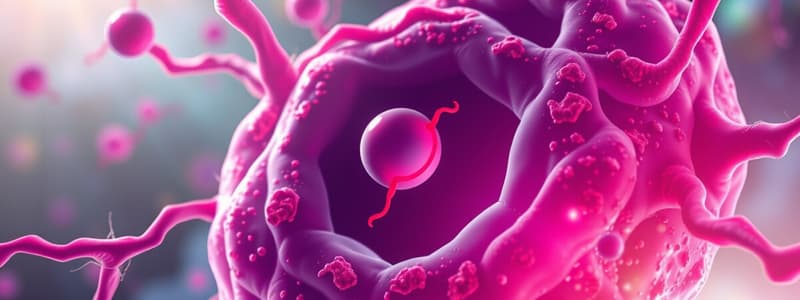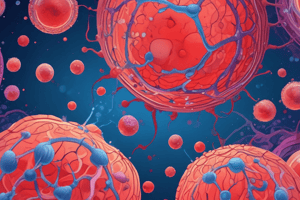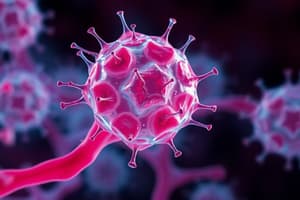Podcast
Questions and Answers
What is the typical red blood cell (RBC) count range in a person with Oyythemia vera?
What is the typical red blood cell (RBC) count range in a person with Oyythemia vera?
- 8 to 9 million/mm³ (correct)
- 2 to 3 million/mm³
- 5 to 6 million/mm³
- 10 to 12 million/mm³
What effect does increased blood viscosity have on capillary flow?
What effect does increased blood viscosity have on capillary flow?
- It has no effect on blood flow.
- It leads to sluggish blood flow. (correct)
- It stimulates faster blood flow.
- It causes blood pressure to decrease.
Which factor can lead to an increase in RBC count?
Which factor can lead to an increase in RBC count?
- Diurnal variations
- Lower temperatures
- Higher altitude (correct)
- Increased oxygen tension
What is the hematocrit level range in patients with Oyythemia vera?
What is the hematocrit level range in patients with Oyythemia vera?
What happens to red blood cells after birth during the first ten days?
What happens to red blood cells after birth during the first ten days?
What physiological condition leads to variation in RBC count during the day?
What physiological condition leads to variation in RBC count during the day?
What is the average RBC count in an adult male?
What is the average RBC count in an adult male?
How does adrenaline affect the RBC count?
How does adrenaline affect the RBC count?
What is the name of the progenitor cell that gives rise to both myeloid and lymphoid lineages?
What is the name of the progenitor cell that gives rise to both myeloid and lymphoid lineages?
Which of the following is not produced from the common myeloid progenitor?
Which of the following is not produced from the common myeloid progenitor?
Which of the following cell types is specifically associated with thrombopoiesis?
Which of the following cell types is specifically associated with thrombopoiesis?
What is the final differentiated stage before a red blood cell is fully formed?
What is the final differentiated stage before a red blood cell is fully formed?
Which cell type is primarily responsible for the immune response against viruses and tumors?
Which cell type is primarily responsible for the immune response against viruses and tumors?
During which process are granulocytes such as neutrophils and eosinophils produced?
During which process are granulocytes such as neutrophils and eosinophils produced?
What precursor cell gives rise to all types of lymphocytes?
What precursor cell gives rise to all types of lymphocytes?
Which statement about leukocyte lifespan is true?
Which statement about leukocyte lifespan is true?
Which of the following stages occurs first in the differentiation of myeloid cells?
Which of the following stages occurs first in the differentiation of myeloid cells?
What is the primary function of thrombocytes?
What is the primary function of thrombocytes?
What primarily causes the sedimentation of erythrocytes to occur in the blood?
What primarily causes the sedimentation of erythrocytes to occur in the blood?
Which phase of sedimentation shows maximum velocity of erythrocyte aggregation?
Which phase of sedimentation shows maximum velocity of erythrocyte aggregation?
In which condition is the erythrocyte sedimentation rate (ESR) likely to increase?
In which condition is the erythrocyte sedimentation rate (ESR) likely to increase?
What happens to the sedimentation rate of erythrocytes when the positive charge in plasma is increased?
What happens to the sedimentation rate of erythrocytes when the positive charge in plasma is increased?
What is the normal ESR value range for adults using Wintrobe's method?
What is the normal ESR value range for adults using Wintrobe's method?
How does the ESR change in elderly individuals compared to younger populations?
How does the ESR change in elderly individuals compared to younger populations?
What impact does a rise in cholesterol have on the ESR?
What impact does a rise in cholesterol have on the ESR?
What role does plasma protein content play in erythrocyte sedimentation?
What role does plasma protein content play in erythrocyte sedimentation?
What type of anemia is caused by rapid and excessive blood loss?
What type of anemia is caused by rapid and excessive blood loss?
What type of anemia occurs when red blood cells are destroyed faster than they can be produced?
What type of anemia occurs when red blood cells are destroyed faster than they can be produced?
Aplastic anemia results from a defect in which of the following?
Aplastic anemia results from a defect in which of the following?
In chronic blood loss, what type of anemia typically results due to the small size of RBCs and low hemoglobin content?
In chronic blood loss, what type of anemia typically results due to the small size of RBCs and low hemoglobin content?
What characterizes hereditary spherocytosis?
What characterizes hereditary spherocytosis?
What causes sickle cell anemia in affected individuals?
What causes sickle cell anemia in affected individuals?
What contributes to the short lifespan of RBCs in patients with hemolytic anemia?
What contributes to the short lifespan of RBCs in patients with hemolytic anemia?
Why do RBCs produced during chronic blood loss anemia tend to be smaller in size?
Why do RBCs produced during chronic blood loss anemia tend to be smaller in size?
What can be inferred about individuals with sickle cell trait in terms of genetic inheritance?
What can be inferred about individuals with sickle cell trait in terms of genetic inheritance?
Which statement regarding thalassemia is correct?
Which statement regarding thalassemia is correct?
Which of the following statements is false about sickle cell disease?
Which of the following statements is false about sickle cell disease?
Which of the following terms has been used to refer to thalassemia?
Which of the following terms has been used to refer to thalassemia?
What is a characteristic feature of thalassemia?
What is a characteristic feature of thalassemia?
Which options describe the symptoms experienced by individuals with sickle cell trait?
Which options describe the symptoms experienced by individuals with sickle cell trait?
What typically results from the genetic mutation seen in some forms of thalassemia?
What typically results from the genetic mutation seen in some forms of thalassemia?
What distinguishes the two main groups of thalassemia?
What distinguishes the two main groups of thalassemia?
Study Notes
Blood Cell Production
- Hematopoiesis begins with multipotent hematopoietic stem cells (hemocytoblasts).
- Common myeloid progenitor cells differentiate into megakaryoblasts (platelets), erythroblasts (red blood cells), and myeloblasts (white blood cells).
- Common lymphoid progenitor cells develop into lymphoblasts, leading to T and B lymphocytes, natural killer cells, and dendritic cells.
Types of Blood Cells
- Megakaryocytes develop into thrombocytes (platelets).
- Erythrocytes evolve through stages: proerythroblast, basophilic erythroblast, and ultimately reticulocyte.
- WBCs categorized into granulocytes (basophils, neutrophils, eosinophils) and agranulocytes (monocytes, lymphocytes).
Leukopoiesis
- Lifespan of white blood cells varies; difficult to track as they move into tissue.
Erythrocyte Count and Variability
- Normal RBC count ranges from 4.5 to 6 million/mm³ depending on age and gender.
- Increased RBC production at high altitudes due to oxygen deficiency and physiological stress factors like exercise and temperature changes.
Erythrocyte Sedimentation Rate (ESR)
- ESR reflects the rate at which erythrocytes settle in plasma; normal rates differ by age.
- Influenced by plasma protein concentration, with higher levels of cholesterol and fibrinogen increasing ESR.
- Wintrobe method normal values: newborns 0.0-2.0 mm/hr, children 3.0-13.0 mm/hr, older adults typically higher.
Types of Anemia
- Defined as a deficiency of RBCs; can occur due to blood loss, decreased production, or increased destruction of RBCs.
- Blood loss anemia occurs after hemorrhage with a reduction in hematocrit. Chronic loss leads to hypochromic, microcytic anemia.
Hemolytic Anemia
- Characterized by fragile RBCs that rupture easily, often hereditary.
- Types include hereditary spherocytosis (rigid RBCs) and sickle cell anemia (abnormal Hb leads to crescent-shaped RBCs).
Thalassemia
- A genetic disorder leading to decreased synthesis of normal hemoglobin chains.
- Mediterranean anemia, or Cooley's anemia, describes a heterogeneous group resulting in reduced hemoglobin levels, manifesting in various severity forms.
Additional Notes
- Sickle cell trait exists when an individual inherits one mutated gene, whereas full sickle cell disease requires genes from both parents.
- Bone marrow stimulation increases RBC production in response to tissue anoxia, often producing smaller, less hemoglobin-rich cells.
Studying That Suits You
Use AI to generate personalized quizzes and flashcards to suit your learning preferences.
Description
This quiz explores the characteristics and functions of multipotent hematopoietic stem cells, also known as hemocytoblasts. Test your knowledge on their role in the blood formation process and their significance in medical science.



